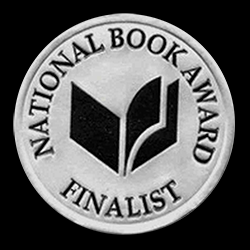Rebels Read, Say National Book Award YA Finalists

NBF Finalist logo(Photo : National Book Foundation)
While Wednesday's National Book Awards ceremony has already stirred up controversy as two sponsors withdrew after some finalists announced plans to make political statements related to the Israel-Hamas war, the top writers for younger readers had no trouble advocating for the freedom of choice in reading material when they addressed an eager audience Tuesday.
About 700 high school and middle school students heard from the shortlisted authors for Young People's Literature at a New York press conference, where finalists read from works that spanned topics from the Ukrainian famine of 1932-33 to a teen's narration of a Muslim-American family's trip to Disneyland. Representation was a keystone message, with works that put Black girls' body issues, an Asian middle-schooler's first travel experiences, and the grim fallout of the opioid crisis front and center.
In a climate where culture warriors advocate book bans and school librarians are demonized for the titles they keep on their shelves, National Book Foundation deputy director Jordan Smith introduced the five finalists with a cautionary note.
This is a hard time for books and authors. Because of book-banning efforts, books are being removed from libraries and classrooms - that's usually because a book deals with real-world topics," she said, ticking off subjects like sexuality, gender identity religion and racism. "Everyone deserves the right to read what they want."
Moderator Dhonielle Clayton, author of "The Conjureverse" series, "The Belles" series, "Shattered Midnight," and a co-author of the Netflix series "Tiny Pretty Things," talked about her childhood love of reading, and the revelatory experience of discovering Black authors.
"Then, I didn't realize that there were people like me and in my neighborhood who could write characters that featured people like me, she said, widening to address the increasing diversity of authors and titles, particularly in children's and young adult writing. "The industry is slowly changing, and today we get to showcase the many different characters and many different stories out there."
In his brief reading from "Gather," Vermont writer Ken Cadow noted said stories help readers explore the world, "and the parts you know the least about are the parts closest to home."
Huda Fahmy's funny, honest graphic novel "Huda F. Cares," touches on typical adolescent issues, like sibling conflicts and chafing under parental rules, but also touches on the female Muslim-American experience, a subject rarely raised in broad market titles. Hers was not an easy path, she said.
"I was never going to be good enough to be a writer - at least according to my parents," she said. "When they asked what I wanted to be when I grew up, I said, 'a writer.' They said, 'That's not how you spell doctor.'"
Vashti Harrison's illustrated book "Big," had few words, but showed the ways in which being big starts as a positive trait for young children, but its meaning changes and curdles quickly, particularly for Black girls.
"Her body is not a problem that needs fixing," she said of her nameless protagonist. "She is deserving of all the care and joy in the world, no matter what."
When Matthew, a 13-year-old boy locked down during the Covid pandemic, discovers his grandmother's papers and photos, his curiosity unspools a history lesson of terrible memories in Katherine Marsh's "The Lost Year: A Survival Story of the Ukrainian Famine." The discovery of his grandmother's girlhood history of surviving the famine caused by Stalin in 1932-33 begins with a secret.
"This book is a mystery,' she said. "It tests you as a reader to see if you can figure out the mystery, to see if you can figure out the twist."
Dan Santat, a proud member of Generation X, spoke to the audience about his memoir "A First Time for Everything," which recounts his first trip to Europe with a group of middle schoolers and teachers. It was, he said, an exercise in freedom that seems difficult, if not impossible, today.
"Your parents came from a generation known as Generation X," he said, talking about the age of latchkey kids, left to their own devices by busy parents. "We got sent outside to do whatever we wanted, and were told, 'Go out and entertain yourselves - I don't want to see your face until the sun goes down.
"I find it funny that all of your parents are hovering, texting you all the time. I think we don't give you credit for being the adults you could be."
Reading freely should be a major part of becoming those adults, Clayton said.
"I believe that stories will save us," she said. "They help us make better sense of this weird world."
© 2023 Books & Review All rights reserved.
Popular Now
1
Books to Read After 'Fourth Wing': Top Picks for Fantasy and Romantasy Fans

2
‘The Secret Public’ by Jon Savage Book Review: An Insightful Look Into the LGBTQ Influence

3
Stephanie Regalado's 'If They Only Knew' Column Is Now A Book, Unleashing 60 Anonymous True Stories to Empower Women

4
'No Wire Hangers' Scene That Almost Did Not Happen: New Book Reveals Faye Dunaway's Struggles

5
Rare First Edition of Aphra Behn's Novel 'Oroonoko' Discovered in Kent: A Historic Literary Find

Latest Stories
Book Reviews
‘The Secret Public’ by Jon Savage Book Review: An Insightful Look Into the LGBTQ Influence

Book News
Stephanie Regalado's 'If They Only Knew' Column Is Now A Book, Unleashing 60 Anonymous True Stories to Empower Women

Book News
'No Wire Hangers' Scene That Almost Did Not Happen: New Book Reveals Faye Dunaway's Struggles

Book Reviews
‘The Perfect Couple’ by Elin Hilderbrand Book Review: A Captivating Summer Mystery

Book News
New Book ‘The Franchise’ Reveals Penguins President Kyle Dubas’ ‘Biggest Mistake’ as Maple Leafs GM











